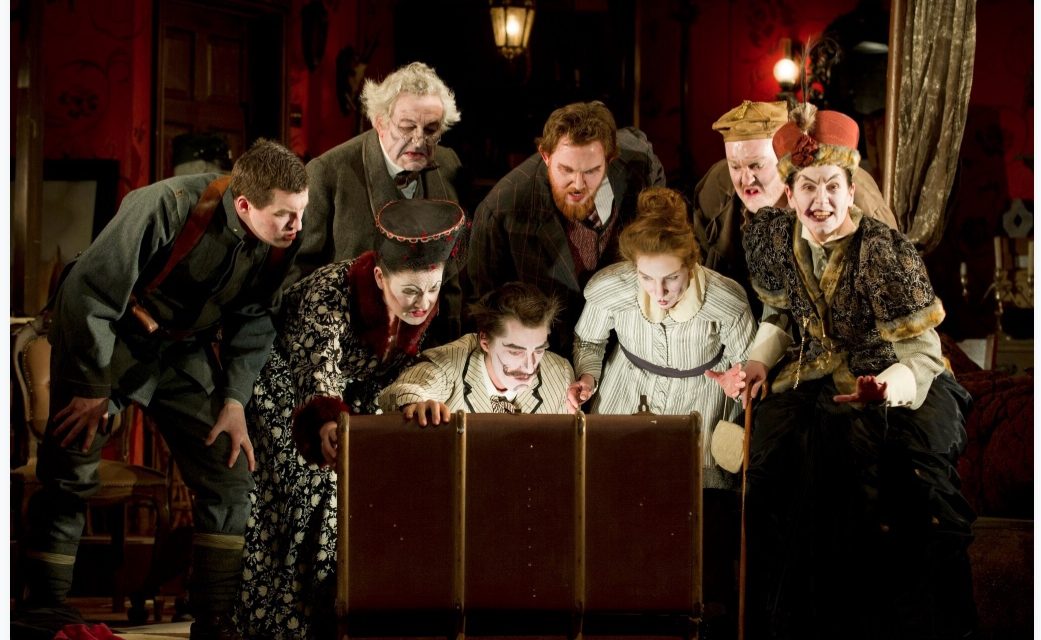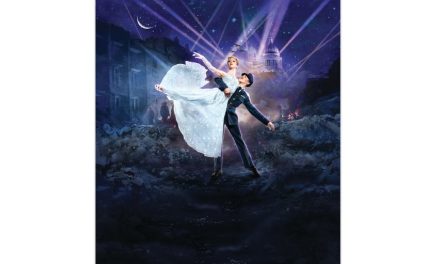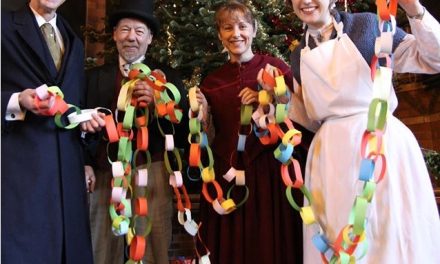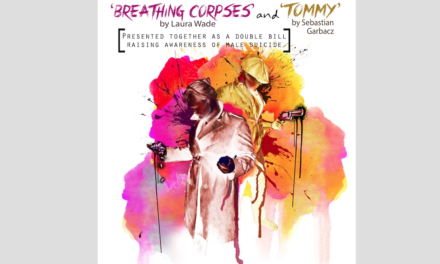Puccini left us some of the most famous and most performed of the great Italian opera compositions but his triptych of one act operas Il trittico is perhaps slightly less well known. The English Touring Opera company brought two thirds of this triptych to Norwich Theatre Royal as part of their current tour in the form of Il tabarro and Gianni Schicchi.
The two works form a strong contrast to each other, with Il tabarro giving us a rather bleak story of infidelity and yearning set on a Parisian barge quay early in the Twentieth Century, while Gianni Schicchi draws on a story from Dante’s Divine Comedy that tells of misbehaviour by a grieving family and their lawyer in 1299.
When English Touring Opera visits you know you can be sure not just of the best of operatic singing but a lively and fresh style of staging, and these two works did not disappoint. The atmosphere is dark, brooding and dangerous in Il tabarro, reflecting the dangers and harsh life on a city quay where stevedores and bargees struggle to make a living. Grey haired Michele (Craig Smith) owns a barge and has a wife much younger than him – Giorgetta (Sarah-Jane Lewis). Their union has been strained since the death of their infant son, and Giorgetta yearns for some diversion and passion in life, which she finds a hint of in the form of docker Luigi (Charne Rochford) with whom she dances as the workers take a break from unloading Michele’s barge. The two furtively embrace and plan to meet later when Michele sleeps. Meanwhile Michele is growing frustrated that his wife no longer wants to be close to him, and suspicious that she has been distracted by another lover. Michele stares into the sunset as his vessel is unloaded, with an unlit pipe in his mouth.
Giorgetta plans to give Luigi a signal by lighting a match when the coast is clear for him to come and meet her by the barge, but Luigi rushes in only to find that the match struck is in fact Michele lighting his pipe. A mortal struggle ensues.
There are many details in this work which make it so rich and rewarding to see and hear, and the staging on two levels works well, with some sub-plot frivolities on the public walkway above the quayside giving a contrast and backdrop to the grimly inevitable tragedy below. The three central characters all ooze desperate sadness and frustration, with Sarah-Jane Lewis looking particularly glum and downtrodden. The large ETO orchestra fill the stage with the sounds of a busy quayside with the river constantly flowing by and deep notes from passing vessels suggested. Maigret creator Georges Simenon set many scenes in his murderous tales on these same quaysides, and would quickly recognise the setting on this stage. This is a must-see production of this one act classic that takes us right into the despair of the quayside love triangle.
After such a serious and tragic work we all feel the need for a bit of light relief, and in the dark world of opera there is little lighter than Gianni Schicchi. The ETO have spiced up the staging by giving all the many grieving family members of just dead Buoso Donati grotesque exaggerated make-up. They wail in unison to show their grief, especially when they think a stranger may be watching, but their collective single thought is to unearth the will of their rich relative who lies stiff on the bed centre stage. They ransack the room in the search for the will, but when it is found it confirms their worst fears – old Buoso planned to leave everything to the monastery.
Young Rinuccio (Luciano Botelho), the youngest relative in this production, is in love with Lauretta (Galina Averina) the daughter of Gianni Schicchi (Andrew Slater). He wants the inheritance to enable them to wed, and by degrees the family decide they need the help of Gianni Schicchi to help them fix the errant will. He agrees, but exacts a considerable price for his efforts which leaves him wealthy on earth but destined for purgatory.
The opera is set entirely in the room of the deceased Buoso who suffers the indignity of being stuffed into a wardrobe while Schicchi impersonates him to recreate his will before a short sighted notary. The production has the feel of a silent movie caper, with almost cartoon like movements of the relatives as they react together to the twists and turns of the collective fraud that they have all embarked upon. The musical high point is when Lauretta sings to her daddy Schicchi the imploring aria ‘O mio babbino caro’ – a tune which we will all instantly recognise if not name. Her plea succeeds and draws Schicchi into the family intrigue, but she then innocently disappears while the dirty deed is done.
With a cast of fourteen this is a busy work with a lot of skilled choreography around the set as the plot unfolds, in both senses. Andrew Slater clearly relishes his role as Schicchi and turns in a great performance of this lovable rogue. The young lovers are suitably convincing, but all the other characters charge around like refugees from a freak show, which is clearly a pretty apt description of this family. Although they rush around like a feral pack of animals they all have a chance to put across their individual and very different characters.
This is a very funny and skilled production of a popular morality tale by a lively and charismatic cast and would make a great introduction to the world of opera for young audiences who may be daunted by some of the more major classics. A thoroughly enjoyable evening of two contrasting but complementary works from one of the greatest composers of the genre.
© Julian Swainson 2018






Recent Comments